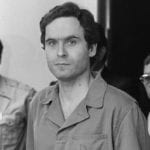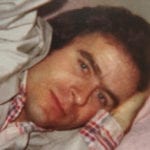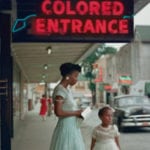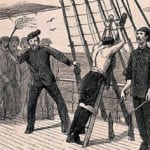 Our World
Our World  Our World
Our World  Pop Culture
Pop Culture 10 Incredible Female Comic Book Artists
 Crime
Crime 10 Terrifying Serial Killers from Centuries Ago
 Technology
Technology 10 Hilariously Over-Engineered Solutions to Simple Problems
 Miscellaneous
Miscellaneous 10 Ironic News Stories Straight out of an Alanis Morissette Song
 Politics
Politics 10 Lesser-Known Far-Right Groups of the 21st Century
 History
History Ten Revealing Facts about Daily Domestic Life in the Old West
 Weird Stuff
Weird Stuff 10 Everyday Products Surprisingly Made by Inmates
 Movies and TV
Movies and TV 10 Actors Dragged out of Retirement for One Key Role
 Creepy
Creepy 10 Lesser-Known Shapeshifter Legends from Around the World
 Our World
Our World 10 Science Facts That Will Change How You Look at the World
 Pop Culture
Pop Culture 10 Incredible Female Comic Book Artists
 Crime
Crime 10 Terrifying Serial Killers from Centuries Ago
Who's Behind Listverse?

Jamie Frater
Head Editor
Jamie founded Listverse due to an insatiable desire to share fascinating, obscure, and bizarre facts. He has been a guest speaker on numerous national radio and television stations and is a five time published author.
More About Us Technology
Technology 10 Hilariously Over-Engineered Solutions to Simple Problems
 Miscellaneous
Miscellaneous 10 Ironic News Stories Straight out of an Alanis Morissette Song
 Politics
Politics 10 Lesser-Known Far-Right Groups of the 21st Century
 History
History Ten Revealing Facts about Daily Domestic Life in the Old West
 Weird Stuff
Weird Stuff 10 Everyday Products Surprisingly Made by Inmates
 Movies and TV
Movies and TV 10 Actors Dragged out of Retirement for One Key Role
 Creepy
Creepy 10 Lesser-Known Shapeshifter Legends from Around the World
10 Most Disturbing Moments During Ted Bundy’s Trials
Serial killer Ted Bundy has been a main topic of conversation following the release of Joe Berlinger’s Conversations with a Killer: The Ted Bundy Tapes. The shocking docuseries used archival footage of the depraved killer’s trials and featured interviews with those affected by his crimes.
Often overshadowed by his crimes, Bundy’s trials are among the most important of the 20th century. His first trial in Florida was the first nationally televised court case in US history. What came next was a turning point for the American justice system and how the media has portrayed serial killers ever since.
10 Carol DaRonch
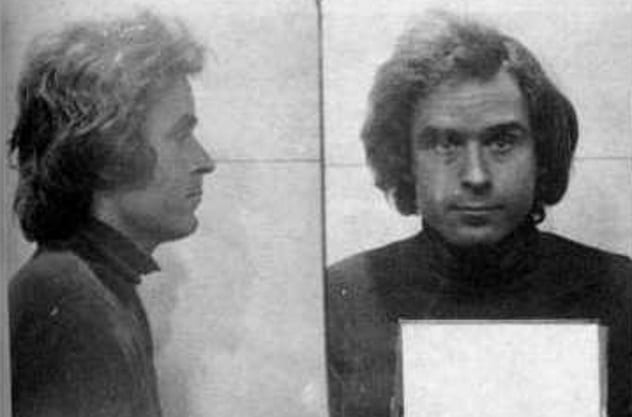
In 1976, Ted Bundy faced his first trial in Utah for the kidnapping of 19-year-old Carol DaRonch. Bundy had approached her in a shopping mall parking lot disguised as a police officer and convinced the young girl to get in his car. She testified, “He grabbed me and put handcuffs on my left arm. I reached to open the [car] door. He grabbed me around the neck. I screamed and fought. Then he pulled a gun out and said he would blow my head off.” She managed to break free and escape with her life. The chilling statement was heard as Bundy sat opposite his intended victim in the courtroom, his focus never shifting away.
Bundy’s attorney, John O’Connell, described DaRonch as an “immature and unsophisticated girl” and claimed that she had been prompted by police officers to pick Bundy out specifically from the lineup.[1] The defense was unsuccessful, and Bundy was sentenced to one to 15 years in prison for aggravated kidnapping, but that was just the beginning of the legal system’s battle to keep him behind bars for good.
9 The Defendant Escapes
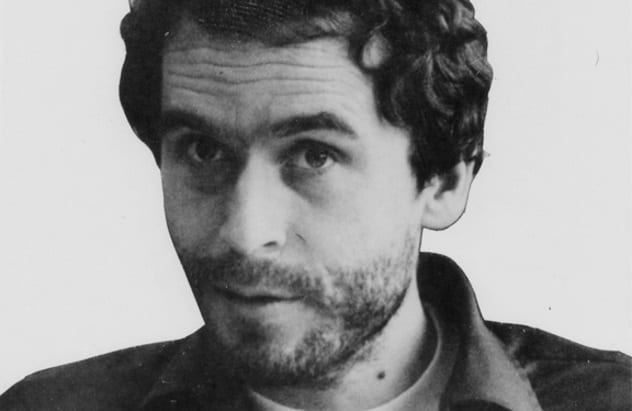
In 1977, Bundy was awaiting trial for the murder of 23-year-old Caryn Campbell. During a preliminary hearing, Bundy requested access to the Pitkin County Courthouse library so that he could research his trial. Serving as his own attorney meant that Bundy did not have to wear handcuffs or leg shackles. Taking advantage of this, he jumped out the second-story window and went on the run.
Following a six-day manhunt, he was finally recaptured. Bundy was sleep-deprived from hiding out in the mountains around Aspen, and his ankle was badly injured. Police officers noticed a car swerving erratically on the road, and when they pulled the driver over, it was none other than Bundy himself. Returning to jail, a sign hanging at the sheriff’s office read: “Welcome Home Teddy.”[2]
Six months later, Bundy escaped again. He had dropped 16 kilograms (35 lb) in weight and was able to climb through a crawl space above his cell. His escape wasn’t noticed for 17 hours. On the run again, this time he chose to head to Florida. He was eventually arrested for driving a stolen vehicle, yet the arresting officer initially had no idea he was in the presence of a notorious serial killer responsible for much more than stealing a car.
8 Overnight Celebrity
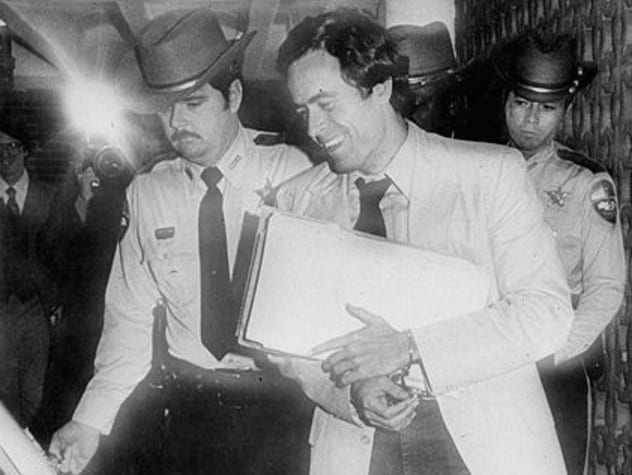
More than 250 reporters gathered in the Miami Metropolitan Justice Building, where Bundy stood trial for the Chi Omega sorority house attacks that resulted in the murders of two students—20-year-old Lisa Levy and 21-year-old Margaret Bowman. The media frenzy was intense. Judge Edward Cowart recalled, “It was really something. I thought I was in a space center.” The cables from the video cameras could be followed five floors upstairs in the courtroom, where a video editing suite was set up so that the trial could be broadcast almost immediately.
Of course, in true narcissistic form, Bundy was known to play up to the ever-present cameras. A former public defender said, “He was very conscious of the camera. Every time something would happen where it would be logical to get a shot of him with the camera, he would look over at the camera and do his thing.” This was just the beginning for one of the most talked-about serial killers in US history.[3]
7 Female Groupies
“The Bundy Effect,” where females have been known to become fascinated with the twisted serial killer, was in full force long before the attractive actor Zac Efron landed the role as Bundy in the 2019 film Extremely Wicked, Shockingly Evil, and Vile. During Bundy’s trial, young women would queue outside the Miami courthouse hoping to get a spot in the public gallery. Despite viewing gruesome evidence such as bloodstained pillows and haunting accounts from the victims themselves, the women claimed there was something about the killer that drew them to him. Women had even traveled from as far as Seattle just to get a glimpse of Bundy.
Cameras outside captured the girls explaining how fascinated they were by the serial killer and necrophile who had yet to be proven guilty. One told the reporters outside the courthouse, “I’m not afraid of him. He just doesn’t look like the type to kill somebody.” Another laughed, “Every time he turns around I kind of get that feeling, ‘Oh no!’ You know? ‘He’s gonna get me next!’ “[4]
6 The Disturbing Evidence
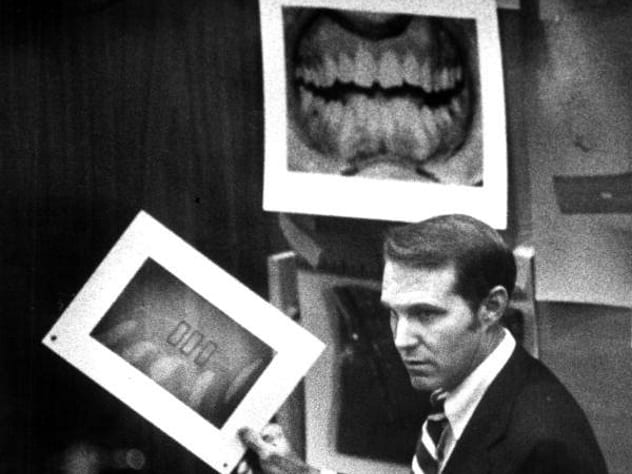
The evidence heard in the courtroom was enough to make anyone want to vomit. Alongside being a cold-blooded killer, Bundy was also a necrophile who gained a thrill from returning to where he buried the bodies of his victims; watching them decompose or violating the corpses further. He also claimed that he threw one victim’s head into the fireplace at the home of his then-girlfriend, Elizabeth Kloepfer. The forensic reports indicated that other bodies’ hair had been washed and their fingernails painted after their deaths, something the detectives believed Bundy had done himself.
Another disturbing moment was when forensic odontologists matched photographs of the bite wounds inflicted on the buttock of victim Lisa Levy with Bundy’s teeth. Despite the damning evidence against him, Bundy raged, “I don’t like being treated like an animal and I don’t like people walking around and ogling me like I’m some kind of weirdo. Because I’m not.”[5]
5 Representing Himself
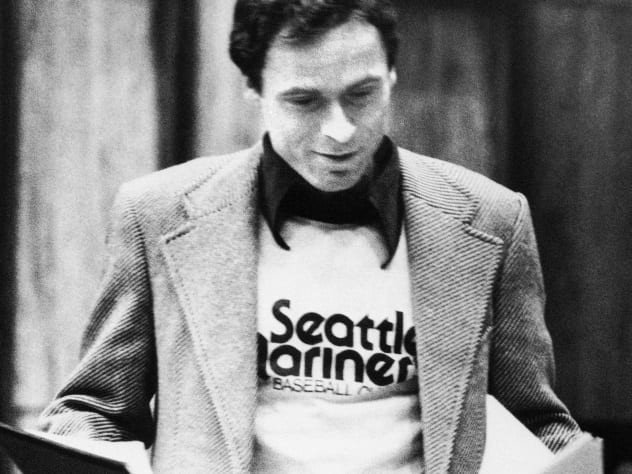
During his trial, Bundy had the counsel of five court-appointed attorneys, yet the former law student decided against their defense and instead represented himself. Originally, a pretrial plea deal was set in motion in exchange for a 75-year prison sentence that would see Bundy avoid the death penalty. However, at the last minute, Bundy changed his mind, realizing that he would have to admit his guilt.
After his request for a typewriter in his jail cell was granted, he appeared in court wearing a Seattle Mariners T-shirt and presented his own motions, which claimed his absolute innocence. In her book Defending the Devil: My Story as Ted Bundy’s Last Lawyer, Polly Nelson writes that Bundy “sabotaged the entire defense effort out of spite, distrust, and grandiose delusion.” She added, “Ted [was] facing murder charges, with a possible death sentence, and all that mattered to him apparently was that he be in charge.”[6]
4 Refusing A Psychological Assessment
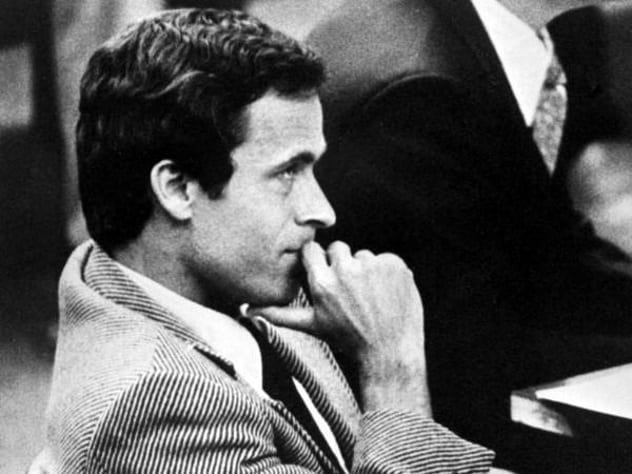
Judge Cowart attempted to appoint a psychiatrist to examine Bundy after the killer was warned several times not to represent himself. Cowart explained to Bundy, “A lawyer who represents himself has a fool for a client.” Other members of Bundy’s former legal team had also argued that their client never received an adequate hearing into his mental competency.
Assistant Attorney General Gregory Costas argued that as Bundy had agreed to represent himself, the discrepancies in his trial were all of his own doing. It was clear that Bundy did not want to be assessed by a psychologist, as his ego always came first. Costas said that poor legal representation was the result of Bundy’s own handiwork: “A good part of the problems he’s complaining about is the result of his own action. [ . . . ] Mr. Bundy himself opposed any competency hearing. Mr. Bundy did not want to be found incompetent.”[7]
3 The Marriage Proposal
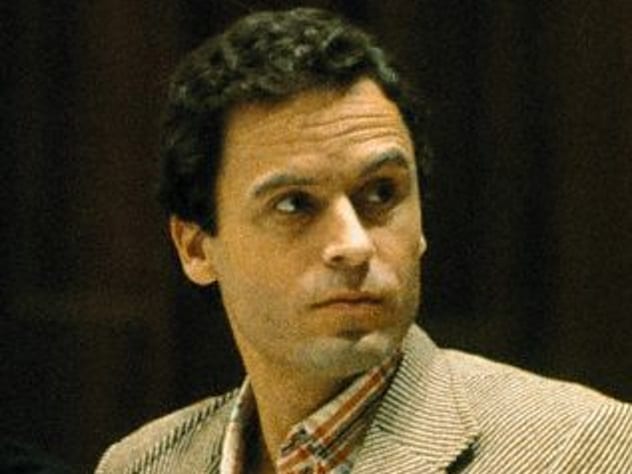
Bundy had been in a relationship with Carol Anne Boone since before his second escape. She had even helped him with his wicked plans, smuggling $500 cash to him, which he used on the run that resulted in the murders at the Chi Omega sorority house.
During the penalty phase of his second Florida trial, which took place in Orlando in 1980, Bundy decided to use a loophole in Florida law whereby if a declaration of marriage was made in court, as long as the judge was present, the marriage would be legally binding. Boone, who had always believed Bundy was innocent, was testifying as a character witness during the trial when he asked her to marry him. She said yes, he declared, “I do hereby marry you,” and they were wed.
While on death row and despite the fact that conjugal visits were prohibited for death row inmates; Bundy and Boone were able to conceive a daughter named Rose. A prison superintendent told the Associated Press, “I’m not saying they couldn’t have some sexual contact, but in that park it would be mightly difficult. It’s stopped as soon as it starts.”[8]
2 Confidence In The Face Of Conviction
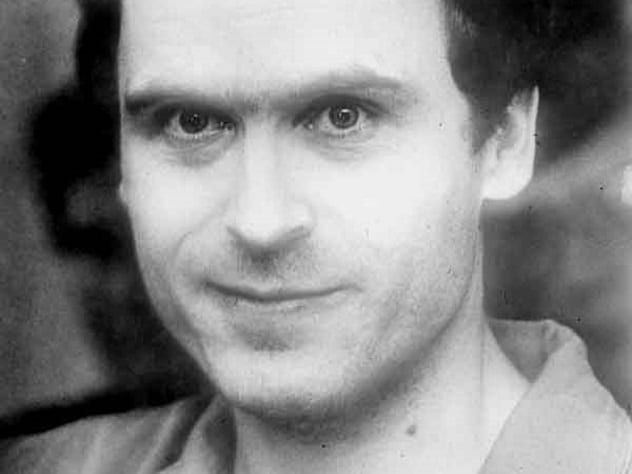
Even with another potential death sentence hanging over his head, Bundy was able to sail through the legal process once more without cracking under the pressure. Patrick E. Wolski was a juror on Bundy’s trial for the murder of 12-year-old Kimberley Leach, the same trial in which Bundy married Boone. The killer had already been sentenced to death plus 196 years for the Chi Omega murders, yet he appeared unfazed when he re-entered the courtroom once again.
Wolski recalls, “I didn’t think the court system was prepared to deal with a person like Ted Bundy. He was smart and I thought he was smart enough to manipulate the courts, to find every loophole, every scheme to keep himself alive.” He added, “I saw Bundy’s intelligence and his cool demeanor during the weeks I shared an Orange County courtroom with him.”[9]
However, not even Bundy could avoid the electric chair for his crimes. He was sentenced to death (again) for the murder of Kimberley Leach.
1 Judge’s Last Words
When Judge Edward D. Cowart, who presided over the first Florida trial, handed Ted Bundy the death penalty for his horrendous crimes, he had some unusual parting words for the serial killer.
Cowart told Bundy, “Take care of yourself, young man. I say that to you sincerely; take care of yourself, please. It’s a tragedy for this court to see such a total waste, I think, of humanity that I have experienced in this court. You’re a bright young man. You’d have made a good lawyer and I’d love to have you practice in front of me, but you went another way, partner. Take care of yourself. I don’t have any animosity to you. I want you to know that. Take care of yourself.”[10]
On January 24, 1989, Ted Bundy died in the electric chair, aged 42 years old. Crowds gathered outside to celebrate the news of his death and set off fireworks while dancing in the street. He is still known today as one of the most notorious serial killers of all time.
Cheish Merryweather is a true crime fan and an oddities fanatic. Can either be found at house parties telling everyone Charles Manson was only 5’2″ or at home reading true crime magazines.
Twitter: @thecheish
Read more chilling facts about Ted Bundy on 10 Times The Police Let Brutal Serial Killers Go Free and 10 Creepy Photos Of People Unaware They Are With A Serial Killer.

